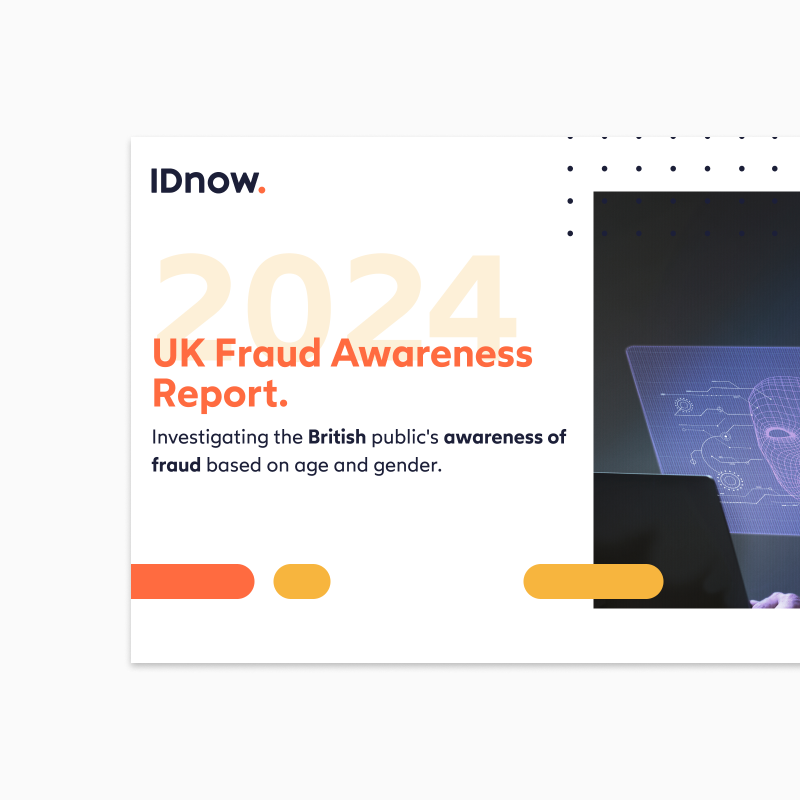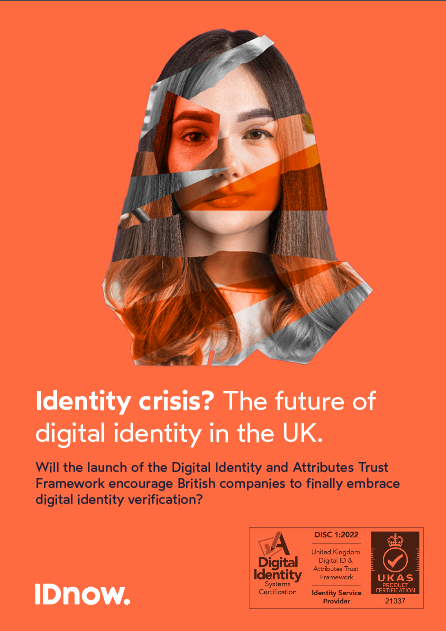We unpack the findings from IDnow’s recent UK and France Fraud Awareness Reports to explore the differences in perceptions of fraud, preferences of identity verification solutions and much more.
Separated by just 34km of the English Channel, there are many things that France and the United Kingdom have in common: size of populations, diversity of cultures, and, unfortunately, alarming rates of fraud.
In France, victims of financial fraud and scams lose at least €500 million annually, while in the UK, the problem appears to be even more pronounced. In fact, in just the first half of 2024, over £570 million was stolen in payment fraud alone.
In 2024, we published the IDnow UK Fraud Awareness Report, which surveyed members of the British public to explore the nation’s awareness of the latest fraud terms, the industries considered most susceptible to fraud, and how commonly Brits used risky channels like unencrypted messaging platforms to transfer copies or scans of ID documents. Last month, we published an edition focused on France, ‘Fraude bancaire : enquête sur la confiance des Français envers leur banque’ [Bank fraud: survey of French people’s confidence in their bank].
Referring to the recent French Report, Cyril Patou, Vice President of Sales (France) at IDnow said: “The results highlight the importance of increased awareness and having open dialogue between financial institutions and users to move forward together in the fight against fraud.”
In this blog, we explore the differences in results between the two nations and consider why a tailored, culture-specific approach to fraud prevention – and identity verification – is required.
UK Fraud Awareness Report 2024

Loyalty, trust and public awareness of fraud.
While 54% of UK respondents said they would consider switching banks if they were a victim of bank fraud, only 27% of French respondents agreed, indicating that either the French were more loyal to their banks or accepting of falling victim to fraud. Surprisingly, 11% of French respondents said they had been victims of bank fraud yet had still not changed banks.
When it comes to fraud terms, the Brits tend to be more informed than their French counterparts. For example, over half of UK respondents said they had heard of ‘deepfakes’ (videos of digitally created people that are typically used to obfuscate the user’s identity), while 42% of French said they had not heard the term combined with a further 25% who said they had heard of deepfakes, but didn‘t know what it means.
Both countries are currently experiencing a rise in sophisticated digital fraud techniques, including deepfakes. In a recent post on social media, French President Emmanuel Macron shared a montage of deepfake videos featuring himself in popular movies, commenting “nicely done.” In the UK, recent Ofcom data shows that 43% of individuals aged 16 and older have seen at least one deepfake online in the last six months. Deepfakes have clearly arrived and being used for both fun and fraudulent purposes. In fact, the UK government recently declared deepfakes as the “greatest challenge of the online era.”
Attitudes on whether banks are adequately protecting their customers against fraud like deepfakes are largely the same in France (72%) and the UK (73%), leaving more than a quarter of respondents in both countries that either disagree or just don’t know – suggesting better education on not only the latest fraud terms but banks’ methods of fraud prevention is needed.
Which industries cause the French and British public the most concern?
Both France and the UK agree that the riskiest industry when it comes to fraud is financial services (65% and 75% respectively) followed by online shopping. Clearly, these are both industries where it serves for customers to be as cautious as possible, as bank and e-commerce accounts store important personal identifiable information that can be misused for fraudulent purposes.
Third on the ranking of riskiest industry is social media fraud, which is where a lot of fraud originates, especially social engineering. Discover all about the rise of social media fraud, and how one man almost lost a million euros to a pig butchering scam in our blog, ‘The rise of social media fraud: How one man almost lost it all.’
One of the major differences seen in the IDnow Reports is the perception of public services as a potential source of fraud. While in France, nearly a third of the French population (32%) are concerned, just 13% of the UK public appear worried about eGovernment fraud. Could it be that the French are just more critical of eGovernment services or perhaps it’s just that a higher percentage of the French population are using eGovernment services.
It appears to be the former, as in 2023, just 34% of the French public reported high or moderately high trust in the national government, below the Organisation for Economic Co-operation and Development’s average of 39%.
Identity crisis? The future of digital identity in the UK.

Government and public preferences in identity verification solutions.
Most industries are either required by regulation to implement identity verification checks or have chosen to do so to optimize processes or fight fraud. Such checks are required for account opening in Banking, compliance checks in Crypto, age verification in Mobility, streamlined check-in processes in Travel, financial risk checks in Gambling, and contract signing in Telecommunication.
Identity verification requires users to provide and have information associated with their identity verified. This may be checking an identity document, such as a driver’s license, passport, or a nationally issued identity document or by biometric authentication of users’ attributes like fingerprints or facial features.
Each country tends to have different approaches to fraud prevention and identity verification processes, which is often determined by regulatory requirements. In Germany, for example, video verification is required when opening bank accounts due to strict AML/GwG requirements, however this may all be set to change in the near future.
In France, the government has a national digital identification program and provides citizens with electronic ID cards that facilitates secure access to various services. This centralized system enhances the efficiency of identity verification processes across both public and private sectors. France also has FranceConnect, the national digital identity federator, where users verify themselves for eGovernment and other regulated services. Our report found that the concept of digital identities was familiar to 72% of French respondents. Plus, a large majority of French (70%) said they would be prepared to use a digital identity to access bank accounts or carry out important transactions.
Learn more about our digital identity wallet product, YRIS, which features on FranceConnect here.
In the UK, there is currently no one consistent and coherent ID system, with companies instead relying on database checks and document checks of different forms of ID, including driving licences and passports. However, the government is experimenting with various ways of modernizing its approach, including the 2023 release of a Digital Identity and Attributes Trust Framework (DIATF) – a set of rules and standards designed to establish trust in digital identity products.
There was also a flurry of activity at the beginning of 2025 with the announcement that the government planned to launch the GOV.UK Wallet, which was very quickly followed up by panicked questions regarding its impact on the DIATF.
Once launched, the holders of the GOV.UK Wallet will be able to:
- Securely save government-issued digital documents
- Present these documents to organizations, businesses and other parts of government to prove age, identity, or eligibility for services
When asked which identity verification method they considered the most trustworthy for a secure, reliable and accurate process, 20% of French respondents said document capture and facial recognition, while 42% of UK respondents cited a combination of electronic identity data checks and document capture and facial verification.
While 16% of French respondents would prefer an expert-led identification process like VideoIdent, just 9% of UK respondents felt the same way. Seemingly, the French are more open-minded toward expert-led solutions than the Brits. However, products like IDnow’s customizable VideoIdent Flex are now becoming increasingly popular in European countries outside Germany, where they have typically enjoyed much success due to national BaFin (Germany’s Federal Financial Supervisory Authority) online onboarding regulatory requirements.
There are clearly differences between the two nations when it comes to awareness of fraud, the industries considered riskiest and their preferred methods of identity verification. However, what is consistent in both the UK and France is the ever-present risk of fraud and the need for a collaborative push by regulatory and government bodies and financial services to commit to fraud prevention.
Thankfully, whether automated or expert-led, online or in-person, IDnow offers one of the widest ranges of identity verification and digital signature solutions in Europe and beyond. Learn more about how our solutions can be used to prevent fraud while maximizing conversions by clicking the relevant category above.
Interested in what our customers said were their top identity verification challenges last year and how they planned to tackle fraud in 2024? Read our ‘Fraud in 2024: IDnow customers have their say.’ blog
By

Jody Houton
Senior Content Manager at IDnow
Connect with Jody on LinkedIn



